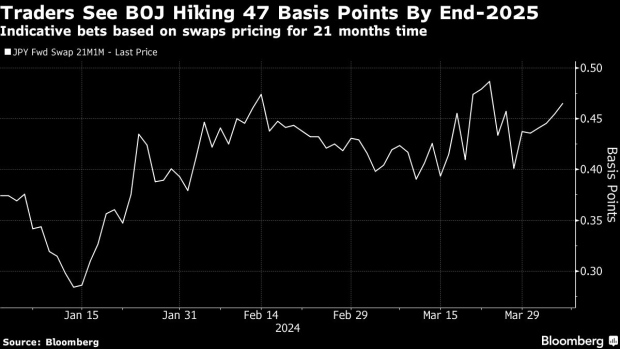
(Bloomberg) — Legal & General Investment Management is betting policy action from the Bank of Japan will fall short of market expectations.
The UK’s biggest asset manager is positioning for the yen to weaken further against the euro as it expects any intervention by authorities to do little to support the battered currency. It’s also bought Japanese bonds of around seven to 10-year tenors, hedged with US Treasuries, on the prospect the BOJ does not hike interest rates as much as expected.
These are contrarian moves, given many market participants are anticipating the yen to strengthen and bonds to fall following the BOJ’s historic move to lift rates out of negative territory last month. The yen has halted a slide after nearing the 152 per dollar level seen as a line in the sand for intervention, while Japanese bonds are under pressure.
“There’s plenty of people who think the Japanese government bond market is going to explode,” said Christopher Jeffery, head of macro strategy at LGIM, which has around $1.5 trillion in assets under management. Japanese 10-year yields have already surged from 0.56% in mid-January to about 0.79% now, with the market pricing just under 50 basis points of BOJ hikes over the next 21 months.
“We think this is quite a high hurdle to meet, particularly in an environment which looks like global inflation pressure is rolling over,” he said in an interview. “The Bank of Japan removing yield curve control does not necessarily mean inevitable upward pressure on rates.”
The bets target the key theme in global markets of recent months: just how much central banks will shift policy and whether divergence between them will spark trading opportunities. Bank of Japan Governor Kazuo Ueda this week signaled a further rise in interest rates is probable in the second half of the year, as the likelihood of attaining the bank’s inflation target will continue to rise.
Still, unless the Federal Reserve starts cutting US rates at a meaningful clip, the lofty interest-rate differential between the two countries will see yen weakness persist, Jeffery contends. He prefers to position for the yen falling against the euro, rather than the dollar, to avoid volatility from changes to the US rate outlook.
Read more: Why Even a Historic BOJ Rate Hike Has Failed to Save the Yen
“Yen weakness can continue despite the fact we’re at levels where intervention is a live threat,” he said. “The moves are not entirely ‘speculative’ when Japanese rates are at zero and the US is at 5%, that’s a fundamental driver and it’s difficult for Japanese authorities to stand in the way of that.”
–With assistance from James Hirai.
©2024 Bloomberg L.P.






